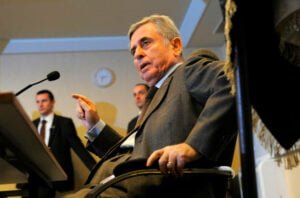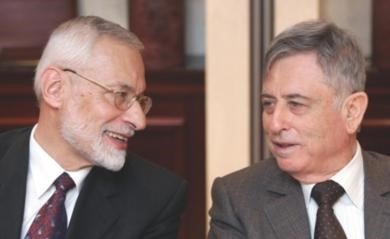
Exiled Syrian opposition leaders announced the creation of a united front on Friday (March 16) with the aim of forming a transitional government to replace President Bashar al-Assad with democracy.
A group of 17 exiled politicians — all men — negotiated until late in the night in a smoke-filled room in a Brussels hotel on a joint declaration aimed as a roadmap for an uprising.
Former Vice-President Abdel-Halim Khaddam, who broke with Assad last year after serving under his late father Hafez al-Assad, told a news conference that all factions of the Syrian opposition and activists had come to the conclusion that the Syrian regime had to be changed.
The two-day meeting in Brussels included the Muslim Brotherhood, liberals, communists and Kurds, at which they drew up a joint declaration on a six-month transition period for a post-Assad era.
However, it is not clear how much popular support the combined opposition can command in Syria, a tightly controlled country where penalties for dissent can be high.
Assad is under severe international pressure over the assassination of former Lebanese Prime Minister Rafik al-Hariri last year, which prompted mass protests and a United Nations resolution forcing the withdrawal of Syrian troops from Lebanon.
But, despite mass demonstrations, there has been little sign of popular protest inside Syria.
Assad and his vice-president have agreed for the first time to talk to the U.N. inquiry, the world body said this week.
“The Syrian people are fed up with the current situation and we expect that a lot of new circumstances will lead to the uprising of the Syrian people,” former Vice-President Abdel-Halim Khaddam said.
Khaddam forecast “regime change” in Damascus this year, within a few months, because he said Assad was making many mistakes and “digging himself into a hole” and the economic and social situation was becoming more intolerable.
He said he expected a U.N. investigation in to the assassination of former Lebanese Prime Minister Rafik al-Hariri last year to point a finger of accusation directly at the Syrian president, which could trigger the fall of the leadership.
Khaddam, who lives in France, said he chose to stage the meeting in Belgium because he is bound by French law to refrain from making statements against foreign governments as a condition of political asylum.
He said he had many supporters within the ruling Baath Party and the army.

